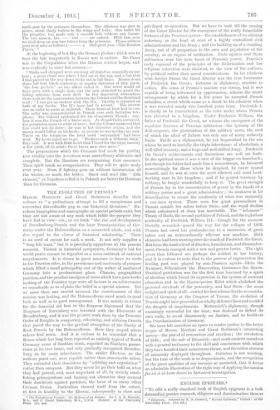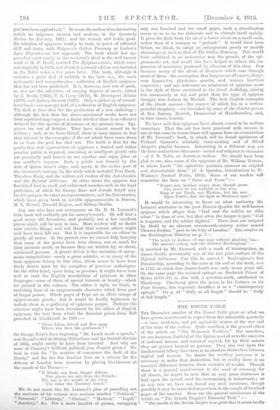ENGLISH EPIGRAMS.* " To edit a really standard book of
English epigrams is a task demanding greater research, diligence and discrimination than as • Epigrams. Selected by R. M. Leonard. " Oxford Garlands." Oxford : at the University Press. 17d. net.]
yet have been applied to it." So wrote the author of an interesting article on epigrams, ancient and modern, in the Quarterly Review for January, 1865 ; and the remark still holds good. No selection of epigrams worthy to rank, in point of editorial skill and taste, with Palgrave's Golden Treasury or Locker's Lyra Elegantiararn has appeared. The book which has ap- proached most nearly to the reviewer's ideal is the well-known work of II. 1'. Dodd, entitled The Epigramrnatist•s, which came out originally in 1870, and of which a second edition was included in the Boliu series a few years later. This book, although it contains a great deal of rubbish, is the best—i.e., the most systematic and comprehensive--collection of English epigrams that has yet been published. It is, however, now out of print, as also are the selections, of varying degrees of merit, edited by J. Booth (1863), C. S. Carey (1872), W. Davenport Adams (1879), and Aubrey Stewart (1897). Only a picker-up of second- hand books can now get hold of a collection of English epigrams. The field is thus clear for the production of a now anthology : although the fact that the above-mentioned works have not been reprinted may suggest a doubt whether there is an effective demand for this species of literature at the present time. Epi- grams aro out of fashion. They have almost ceased to be written ; and, as we have hinted, there is some reason to fear that interest in the examples of the art which have come down
to us from the past has died out. The truth is that for the production and appreciation of epigrams a limited and rather peculiar public is required, consisting of intelligent people who are personally well known to one another and enjoy jokes at one another's expense. Such a public was formed by the vas of Queen Anne's reign, and, again, in the earlier part of the nineteen lb century, by the circle which included Tom Hood, Theodore Hook, and the writers and readers of the Anti-Jacobin and the Rejected Addresses. At other times the epigram has flourished best in small and cultivated societies such as the legal profession, of which Sir George Rose and Joseph Jekyll may for this purpose be taken as representatives, and the Universities, which have given birth to notable epigrammatists in Porson, H. L. Manscl, Thorold Rogers, and Bishop Stubbs.
Any one who lays out sevenpence on Mr. R. M. Leonard's little book will certainly get his money's-worth. He will find a good many old favourites, and probably not a few excellent pieces which will be new to him. Most readers will no doubt miss certain things, and will think that certain others might well have been left out. But it is impossible for an editor to gratify all tastes. In the present case we cannot help fancying that some of the poems have been chosen, not so much for their intrinsic merit, as because they are written by, or about, celebrated persons. A graver defect is the exclusion of anony- mous compositions—surely a great mistake, as so many of the best epigrams belong to this class, which seems to have been freely drawn upon by the compilers of previous anthologies. On the other hand, space being so precious, it might have been well to omit the English translations of epigrams in other languages—none of them of special interest or beauty—which are printed in this volume. The editor is right, we think, in excluding lines of an epigrammatic character which form part of longer poems. Whole pages of Popo are in effect strings of epigrammatic pearls ; but it would be hardly legitimate to include them in a gathering of epigrams proper. Perhaps the selection might have been introduced by the oldest of English epigrams, the text from which the Socialist priest John Ball preached at Blackheath in 1381 :— " When Adam delved and Eve span, Where was than the gentleman 1 " Sir George Rose's lines beginning " Mr. Leach made a speech," and 3Iuusel's skit on Bishop Wilberforce and the Oxford election of 1865, ought surely to have been inserted. And why are none of Canning's brilliant political jeux d'esprit given ? We look in vain for " In matters of commerce the fault of the Dutch," and for the less familiar lines on a scheme for the defence of London from invasion by placing blockhouses at the mouth of the Thames s-
" If blocks can from danger deliver, Two places are safe from tho French : The ono is the mouth of the river,
The other the Treasury bench."
We do not much like Mr. Leonard's plan of parcelling out the contents of his volume into sections labelled " Political," " Personal," " Literary," " Clerical," " Medical," " Legal," " Amatory," &o. For a mere handful of poems, occupying
only one hundred and ten small pages, such a classification seems to us to be too elaborate and to obtrude itself unduly. It gives the little book the air of a liortits siccus on a small scale, rather than of a nosegay or " garland." It would have been better, we think, to adopt an arrangement purely or mainly
chronological, such as that of The Golden Treasury. This would have exhibited in an instructive way the growth of the epi-
grammatic art, and would also have helped to relieve the im- pression of monotony produced by effusions of this class. One becomes weary of the strain of ill-nature which runs through
most of them—the assumption that lawyers are all rogues, clergy. men hypocrites, physicians quacks, and women heartless
coquettes ; and one welcomes an admixture of epigrams more in the style of those contained in the. Greek, Anthology, aiming
less strenuously at wit and point than the typo of epigram brought into fashion by Martial. The best English examples of the Greek manner—the essence of which lies in a certain graceful simplicity—are furnished by some of the shorter poems of Ben Jenson, Herrick, Drummond of Hawthoruden, and, in later times, Lander.
We have said that epigrams have almost ceased to be written nowadays. That the art has been practised with success in one or two eases in recent times will appear from an examination of Mr. Leonard's book, in which will be found specimens• of Richard Garnett's scholarly verse-making and of Alfred
Ainger's playful humour. Interesting in a different way are the terse sententious utterances—moral and religious in character —of J. R. Tabb, an American author. We should have been glad to see, also, some of the epigrams of Mr. William Watson, in whose hands " the aphoristic quatrain assumes an original and characteristic form " (J. A. Spender, Introduction to W. Watson's Poetical Works, 1005). Some of our readers will remember the linos on " Prose and Verse " :- " Forget not, brother singer, that, though prose Can never bo too truthful or too wise, Song is not Truth, not Wisdom, but the rose Upon Truth's lips, the light in Wisdom's eyes."
It would be interesting to know on what authority Mr. Leonard attributes to the poet Francis Quarles the well-known epigram which alleges that " God and the soldier we alike adore " in timo of war, but that when the danger is past " God
is forgotten and the soldier slighted." These lines are assigned by Dodd to an obscure seventeenth-century writer named Thomas Jordan, " poet to the City of London." The couplet on the Rockingham Ministry on p. 7-
" The troth to declare—if one may without shocking 'em—
The nation's asleep, and the Minister Rockingham "- is ascribed by Mr. Leonard, with a mark of interrogation, to James Smith, presumably one of the two joint-authors of the Rejected Addresses. Can this be correct ? Rockingham's last Premiership, according to the note at the end of the book, was in 1782, at which date James Smith was only seven years old. On the same page the satirical epitaph on Frederick Prince of Wales (1707-51) is, also with a question-mark, attributed to Thackeray. Thackeray gives the poem in his Lectures on the Four Georges, but expressly describes it as a " contemporary epitaph." On p. 47 " Folly at all length " should be. " Folly at full length."





















































 Previous page
Previous page